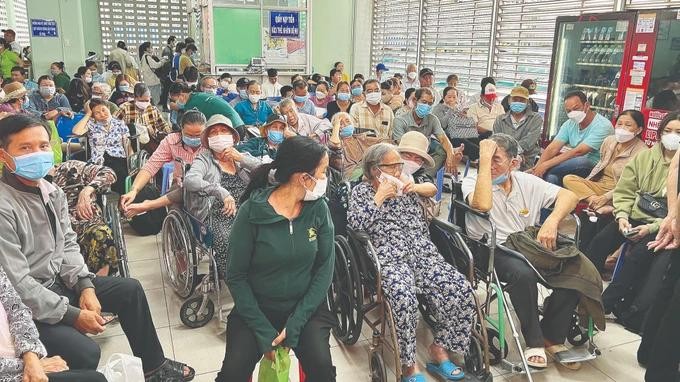Experts and the public widely hail the new policy of free hospital care for all as a major breakthrough that exemplifies a profound humanitarian vision, creating greater healthcare access and enhancing quality of life, especially for the underprivileged people.

Every month, resident Nguyen Van Duc of Kon Tum Province has to go to the Oncology Hospital in Ho Chi Minh City for examination and to receive medicine to treat esophageal cancer. He visits the hospital for chemotherapy on the seventh of each month, spending over VND6 million (US$231) on medication.
His and his wife's income from farming has been dramatically reduced after each chemotherapy session whereas his family depends on the coffee plantation, when the harvest is good, they have income, when the harvest is bad, it is very difficult. Therefore, when he heard that the Government was about to have a policy of free hospital fees, he was very delighted hoping that this policy will soon become a reality.
Deputy Director of Cho Ray Hospital in Ho Chi Minh City Dr. Pham Thanh Viet said that eliminating hospital fees for everyone will promote equity in healthcare, whereas charging fees will perpetuate inequality. With free treatment, all patients can access medical services equally, irrespective of their financial situation. Furthermore, with the removal of hospital fees, individuals are less likely to overcrowd emergency services and can take the initiative to monitor their health at local healthcare facilities.
Moreover, according to him, a person with serious illness can easily plunge their family into debt—or even bankruptcy. For many individuals, particularly ethnic minorities, residents of remote areas, and low-income workers, the high cost of medical care remains a significant barrier, deterring them from seeking necessary treatment. Waiving hospital fees would remove this financial obstacle, ensuring that everyone can access essential healthcare services without hesitation. This is why so many people are hopeful and supportive of this compassionate policy.
According to health experts, General Secretary To Lam’s directive to move toward free healthcare represents not only a strategic long-term vision but also a concrete objective that the health sector is committed to achieving. The adoption of this policy is expected to significantly enhance access to healthcare services, promote proactive prevention and early detection of diseases, improve treatment outcomes, and ensure more efficient use of health financing. It would also help reduce the financial burden on individuals, create opportunities for poverty reduction, and contribute to the development of a healthier, more capable workforce.
However, realizing this vision requires a clearly defined roadmap, an effective management framework, and meticulous planning of financial resources. Medical costs are inherently diverse and complex, making them difficult to control. No country can unconditionally cover all medical expenses, treatments, and services without establishing appropriate limits and criteria.
According to Deputy Minister of Health Tran Van Thuan, before moving towards universal health insurance, the immediate feasible solution is to exempt health insurance cards for all people, especially supporting vulnerable groups to reduce the burden of health care costs.
At present, health insurance plays a crucial role in alleviating the financial burden associated with medical examinations and treatments. With a health insurance card, individuals can utilize medical services without the stress of expenses. The Ministry of Health is in the process of preparing a report for the Government, which will be submitted to the Politburo, aiming to establish a transformative resolution in public healthcare that aligns with the demands of national progress in this new time.
The Ministry of Health has urgently prepared a decree that details and guides the implementation of the Law on Health Insurance, which is slated to take effect on July 1, 2025, and has submitted it to the Government for consideration and issuance. At the same time, the Ministry of Health has proposed a range of solutions aimed at strengthening the healthcare system, improving public health, and moving toward the goal of universal hospital fee exemptions by 2030.
According to Deputy Minister Tran Van Thuan, the two key directives outlined by General Secretary To Lam—annual health check-ups for all citizens and the elimination of hospital fees—are more than just health targets; they embody a powerful message that public policy must be rooted in the people, serve the people, and contribute to a sustainable Vietnam. Achieving regular health screenings for the population is entirely feasible, provided there is strong political will, widespread societal support, and a well-defined roadmap for implementation.
























